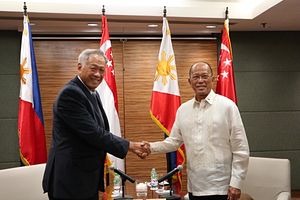This week, Singapore offered the Philippines military assistance as Manila continues to battle Islamic State-linked terrorists in the country’s south. The move illustrates the growing alarm in the city-state as well as in Southeast Asia more broadly about the nature of the terrorist threat and its serious implications for regional security.
As I have pointed out previously, Southeast Asia remains a key front in the battle against the Islamic State. Over 1,000 fighters have flocked from Southeast Asia to join the group in Iraq and Syria, and we have seen a string of planned attacks surface, some of which have been successful. Fears that the group could be looking to establish a caliphate base in the subregion from which to launch further attacks – one that Singapore’s officials have long been warning about – have only risen with the recent siege in the southern Philippine city of Marawi (See: “What Did the ASEAN Trilateral Terror Meeting Achieve?”).
From July 18-19, Singapore’s Defense Minister Ng Eng Hen visited the Philippines, where he met with his counterpart Defense Secretary Delfin Lorenzana. Though the agenda of the meeting included a series of issues ranging from terrorism to the ongoing minilateral efforts in the Sulu-Sulawesi Seas, the highlight of the meeting was the city-state’s counterterrorism assistance to the Armed Forces of the Philippines (AFP).
Specifically, Ng offered a Republic of Singapore Air Force C-130 transport aircraft to deliver humanitarian supplies to the evacuees from Marawi; use of the SAF’s urban training villages for the AFP troops (which have had a tough time battling in an urban environment in Marawi), and a detachment of Unmanned Aerial Vehicles (UAVs) or drones to enhance the AFP’s intelligence, surveillance and reconnaissance capabilities.
He also suggested that the city-state could help in other areas such as coordinating humanitarian assistance for the reconstruction of Marawi. As I have noted before, Singapore currently plays host to several regional facilities, including the Changi Regional HADR Coordination Center (RHCC).
The assistance Ng offered during his visit, which was his first since an introductory visit back in 2014, was specifically tailored to the immediate needs of the AFP, which remain significant considering the Philippines’ limited military capabilities. In turn, Lorenzana expressed his appreciation and in-principle acceptance of the offer, and in fact indicated that the Philippines could also learn some lessons from Singapore, including how it deals with Islamic schools and returning foreign fighters.
In a Facebook post following the meeting, Ng again dwelled on the growing threat posed by the Islamic State, noting that ISIS-linked networks have openly declared their goal to establish an Islamic caliphate in ASEAN as they did in Iraq and Syria, and that if they did succeed in establishing bases in cities like Marawi, they could then launch further attacks against other cities within the Philippines and Southeast Asia more broadly.
As Ng correctly noted, Singapore is just the latest in a series of countries that have been mulling or offering various forms of assistance to the Philippines recently, with some being more public about it than others. The list included not just countries within Southeast Asia like Indonesia and Malaysia or longtime allies and partners like the United States and Australia, but also others as well like India and China.

































